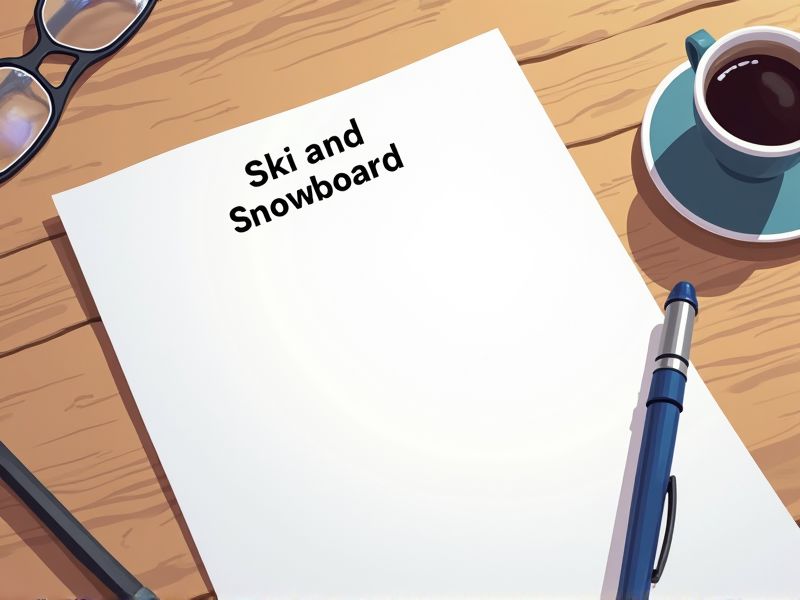
The need for specific certifications for ski and snowboard instructors directly correlates with the necessity to ensure safety and confidence on the slopes. Certifications provide a standardized measure of an instructor's skills and knowledge, which helps in maintaining high teaching standards. Also, they enhance the trust between instructors and their clients, creating a positive learning environment. Key certifications can significantly impact an instructor's professional credibility and employment prospects.
Professional Ski Instructors of America (PSIA) Level 1 Certification
Earning the Professional Ski Instructors of America (PSIA) Level 1 Certification equips instructors with foundational teaching skills essential for effectively coaching beginner skiers. This certification validates an instructor's understanding of basic skiing techniques, safety protocols, and teaching strategies. Resorts often require certified instructors to ensure consistent and professional instruction for guests. Possessing the Level 1 Certification can increase an instructor's credibility, leading to wider job opportunities in ski schools.
Professional Ski Instructors of America (PSIA) Level 2 Certification
Achieving the PSIA Level 2 Certification enhances credibility by demonstrating advanced teaching and technical skiing skills. Certified instructors tend to access better job opportunities, often translating to higher compensation in ski schools. Industry standards often require Level 2 certification to maintain quality instruction and safety on the slopes. Holding this credential promotes personal growth and the ability to cater sessions to diverse student needs, elevating overall teaching proficiency.
Professional Ski Instructors of America (PSIA) Level 3 Certification
Achieving the PSIA Level 3 Certification demonstrates advanced technical understanding and teaching skills, which boosts an instructor's credibility and marketability. This certification enables instructors to teach and manage a wider range of students, leading to increased client satisfaction and retention. Ski resorts and employers often require or prefer instructors with this certification as it ensures a high standard of instruction quality and consistency. The certification process helps instructors hone their expertise, fostering career longevity and progression within the ski and snowboard industry.
Professional Snowboard Instructor Certification (PSIA-AASI Snowboard Group)
Certification from the PSIA-AASI Snowboard Group validates an instructor's expertise, ensuring they have mastered essential skills and safety protocols. Certified instructors are more likely to provide high-quality instruction, enhancing the learning experience for participants. Ski resorts may prefer or require certification to maintain their reputation for safety and professionalism. Certification often leads to better job opportunities and higher compensation for instructors, attracting skilled individuals to the industry.
Canadian Ski Instructors Alliance (CSIA) Level 1 Certification
The Canadian Ski Instructors Alliance (CSIA) Level 1 Certification provides foundational teaching techniques and skills essential for instructing beginners, which increases the effectiveness of ski and snowboard lessons. Certification ensures instructors are knowledgeable about safety protocols and risk management, reducing the likelihood of accidents on the slopes. Ski resorts often require this certification as part of their hiring criteria, ensuring a standard quality of instruction across their programs. Having CSIA Level 1 Certification enhances an instructor's credibility and professional development within the ski industry, leading to more job opportunities and career advancement.
Avalanche Awareness (Level 1) Certification
Avalanche Awareness Level 1 Certification provides ski and snowboard instructors with crucial knowledge about snowpack stability, crucial for guiding clients safely in potential avalanche areas. This certification equips instructors with skills to assess terrain for avalanche risks, reducing the likelihood of accidents. Understanding avalanche warning signs and emergency response enhances the instructor's ability to make informed decisions in hazardous conditions. Proper training in avalanche awareness fosters a safer outdoor environment, instilling confidence in clients and promoting responsible practices in snow sports.
Wilderness First Aid Certification
Ski and snowboard instructors operate in remote and often unpredictable environments, where immediate medical care may be miles away, necessitating Wilderness First Aid Certification for on-the-spot emergency response. Instructors with this certification can effectively assess and handle injuries like fractures or hypothermia, common in such terrains, minimizing complications. The training helps reduce liability for ski resorts by ensuring instructors are equipped to maintain safety standards. Certified instructors enhance client trust and overall safety perception, attracting more participants and improving the sport's accessibility.
CPR/AED Certification
Ski and snowboard instructors often work in environments where accidents and medical emergencies, such as cardiac arrest, happen due to the physical demands and risks associated with the sport. CPR/AED certification equips instructors with essential life-saving skills necessary to respond quickly and effectively in such emergencies. Immediate implementation of CPR and AED can significantly increase the chances of survival for a person experiencing sudden cardiac arrest. Having certified instructors on-site ensures a safer environment, boosting public confidence and trust in the ski resort's commitment to safety.
Ski Touring and Backcountry Safety Certification
Ski touring and backcountry safety certification equips instructors with essential knowledge to assess avalanche risks, minimizing potential accidents. Certified instructors provide students with comprehensive guidance on safe travel techniques in remote areas, ensuring enjoyable experiences without unnecessary dangers. Certification ensures instructors are capable of leading rescue operations, which can be crucial in isolated, uncontrolled environments. The certification aligns with industry standards, increasing the credibility and employability of ski and snowboard instructors.
Coaching and Communication Skills Certification
Ski and snowboard instructors benefit from coaching and communication skills certification because it enhances their ability to convey complex techniques clearly, leading to better learner outcomes. Improved communication skills foster a safer learning environment by minimizing the likelihood of misunderstandings that could result in accidents. Certification in these skills often translates to increased client satisfaction, which can lead to higher retention rates and client referrals. Instructors with these certifications may find more employment opportunities, as resorts often prioritize hiring individuals who can effectively communicate and engage with guests.
Summary
When you earn certifications as a ski and snowboard instructor, you gain a competitive edge in the job market with greater employment opportunities. Certification enhances your teaching ability, leading to improved student satisfaction and retention. Employers trust certified instructors more, so you often receive better compensation and job security. Overall, acquiring certifications positions you as a credible expert, fostering a sense of achievement and professional growth.
